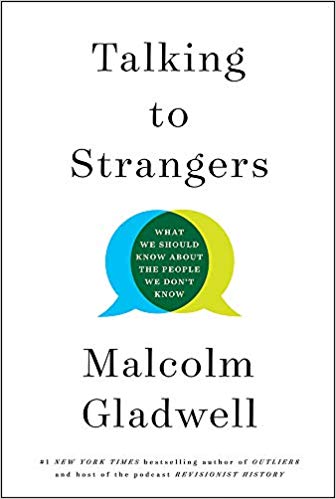You have /5 articles left.
Sign up for a free account or log in.
 Talking to Strangers: What We Should Know About the People We Don't Know by Malcolm Gladwell
Talking to Strangers: What We Should Know About the People We Don't Know by Malcolm Gladwell
Published in September of 2019.
As Jennifer Szalai notes in her critical NYTimes review of Talking to Strangers, Gladwell’s books function as something of a Rorschach test. Our reactions to Gladwell’s writing tends to reveal more about ourselves than the text.
A sure-fire way of upping one’s street cred in the ideaosphere is to dismantle Gladwell. A surprising number of the academic types that I know can’t stand Gladwell. His brand among campus smart-set seems to hover somewhere around TED Talks. Popularizers of academic ideas are surprisingly unwelcome within the groves of academia.
To dismiss Gladwell on the indictment that his writing over-simplifies rather than illuminates would be, I believe, a mistake. A much better strategy would be to learn from Gladwell. Not so much the substance of what Gladwell writes - we will get to that in a second - but how he practices his craft.
Can you imagine if journal articles and academic press books were written with half the care and style that Gladwell brings? A quarter? A tenth? The anti-Gladwell camp complains that his gift for narrative obscures what are, at base, a limited set of mostly banal ideas. So fine, take on the arguments. But admire the craftsmanship.
Talking to Strangers is a riveting listen. That’s right, listen. The best way to experience Talking to Strangers is to listen to the audiobook. Gladwell and team have morphed the production values and theatrical flourishes of the podcast with the affordances of the audiobook. The audiobook of Talking to Strangers features actors, cell phone recordings, and voice clips from YouTube. Gladwell’s reading of his own book makes for a supremely pleasurable listening experience.
But what about the arguments that Gladwell makes in Talking to Strangers?
How can I say this diplomatically? Some of the parts of the book struck me as dangerous bullshit.
Gladwell makes the unfortunate choice to unpack the effects of alcohol on stranger interactions through the prism of sexual assault. He argues that if we want to reduce the incidence of assaults, then a more scientifically based and honest conversation about the effects of alcohol would be in order.
This all may be true. But the specific case Gladwell chooses to highlight is such a clear example of a sex crime - and not an alcohol-fueled misunderstanding between strangers - that the author’s broader arguments end up being almost completely overshadowed.
Should a single offensive example sour the reader on an otherwise provocative book? Of course not. The best action in response to bad ideas is to offer better ones. We should use Gladwell’s chapter on drinking and rape to talk about how we should understand and prevent future assaults. We should articulate a set of better ideas.
On the overall big idea of Talking to Strangers, that humans are terrible at this activity, Gladwell has much to offer.
The idea that we default to truth, and are almost wholly unable to recognize deception when someone looks to be honest, is a powerful construct.
Knowing how poorly our brains have evolved to make accurate judgments about the motives of people we don’t know is a useful piece of knowledge.
Copies of Talking to Strangers should be purchased in bulk by university HR departments and handed out to search committees before any candidate interview.
We should measure our books not by our agreement with its ideas, but by its power to make us think. From this perspective, Talking to Strangers deserves high marks.
What are you reading?








